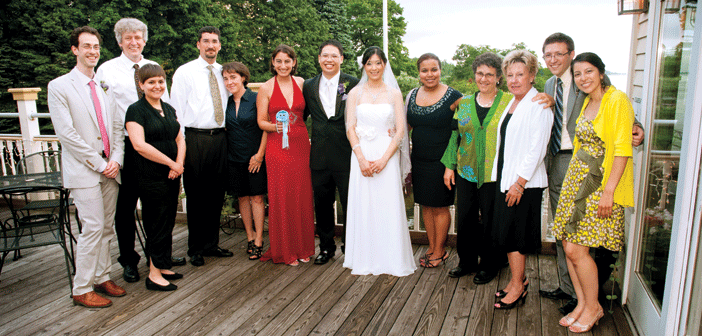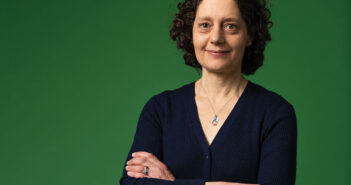To die with dignity, a patient lives with purpose.
“The cancer … they say it’s all over my body.”
I was sitting on the edge of a stretcher when my friend Michaella shared this news with me. It was 10 o’clock at night, and I had run over to meet her at the ER after a grueling day on the oncology service. Michaella had been there for many hours by that point, with family flanking her sides. I stared at her blankly, not quite comprehending what she was saying, not knowing exactly what to say.
Earlier that day, she was complaining of vision changes and had gone to the doctor to have her symptoms checked out. That led to a trip to an outpatient MRI center, where an initial scan revealed findings in her brain suggestive of advanced metastatic cancer. She was then sent to the ER, where she received even worse news: evidence of cancer in her liver and lungs, as well as multiple blood clots in her lungs.
I looked at her. An expression of terror had overtaken her face. Gone was the immaculately dressed woman I was used to seeing in the office. In her hospital gown, she looked frail and vulnerable. Before I knew it, I was crying openly. Michaella’s face softened at that point, as she held my hand.
“Such a pretty girl …” she said. “I’m going to be OK … you’ll see. Once I know how much time I have left, I’m going to figure out how I can live each moment to the fullest.” She paused, looking at the clock on the wall. “But it’s late … and you should get home.”
Michaella Griffin was no ordinary friend. She was, in fact, the program coordinator for the Brown University Combined Internal Medicine/Pediatrics Residency. Always smiling, she was a woman who had a reputation for caring far more about others than she did herself. We often referred to her as a “clinic mom,” as she always had a knack for listening to and solving personal problems.
Michaella was admitted to a room on the oncology ward where my team was stationed. It was the middle of winter— a particularly depressing time, as there was already a census full of sick cancer patients. I was unsure how the negative ambience would affect Michaella, and thus made a vow to check on her every evening before leaving the hospital.
Mornings for Michaella were a flurry of activity. She was seen by doctors, whisked to MRIs, CT scans, and biopsies, and then taken back to her room where a large crowd of visitors awaited her. Never would she fail to have her hair combed and to greet her guests with a kind smile. At night, however, I saw a different side. Michaella’s voice often shook as she told me about the metastases that had been confirmed—in her brain, spinal cord, liver, and adrenal glands. The night before her first radiation therapy, I found her looking more despondent than usual.
“What’s going to happen to me?” Michaella asked, trembling slightly, as I sat down next to her bed.
I looked at her closely.
“That’s not a fair question, is it,” she sighed heavily. “I know I don’t have much time left. I guess I’m just keyed up because no one has been able to tell me exactly how much time that is.”
She smiled slowly as she picked up my hand. “But you’ll be so proud of me. I finally decided it wasn’t worth it, to just sit here worrying about that. When I go, I want to know that I’ve led a life fulfilled. You see, I’ve started making a list of things I’m going to do when I get out of here. And … I put your wedding on my list, too.”
In the Moment
Michaella was eventually discharged, just in time for Christmas. She went back to work at our clinic part time while continuing her cancer treatments. Whatever free time she had was devoted to community service and painting. For a few months, she did well. She was not only present at her son’s wedding, but she made it to mine. There is a picture of Michaellaat our wedding reception that I will always treasure. In it are many members of our clinic. It was the middle of summer, and a perfect sunny day on the East Bay Bike Path served as our backdrop. We look like we are all one big family, and Michaella is standing toward the front—her hair perfectly coiffed.
In the early fall, it became clear that the treatments were not working. After talking with her doctors, Michaella decided to remain at home with hospice. She met with friends, painted, and wrote poetry. She planned her funeral and memorial service down to the last detail so that her children wouldn’t have to worry about it. Gradually she grew weak, her waking moments becoming fewer and fewer. She passed away at home, in the early dawn of a cold autumn day, surrounded by her family.
In medical training, we are exposed to many deaths that end badly. These are the ones that we remember—whether it is a patient who spends every last minute of life withering away in the hospital, or the family that wants everything done for a loved one whose will to live is already shattered. The crux of it is that few people are ready to hear that their life may be coming to an end. Michaella was that rare person who embraced her disease and challenged herself to make every remaining day count. I had been taught to talk to patients and their families about the concept of a “dignified death.” Michaella taught me that I should focus not on the dying, but on helping my patients to live the remainder of their lives well.
Michaella’s memorial ceremony took place on a sunny day. The church was filled with many people from our clinic and community. An inscription on the program caught my eye. It was a poem that a friend had written in her honor:
We all must die
Her life is now fulfilled
Let us look heavenward.
There may well be a newly
risen star, which sings of
resurrection, and of
everlasting love.
Reading those lines, I thought back to my conversation with Michaella in the hospital that winter night. I remember the eagerness in her face when she made the decision to live her life to the fullest. Inside, I smiled—knowing that it would have made her proud to be remembered as having lived a life fulfilled.
Margret Chang is a recent graduate of the Alpert Medical School Medicine/ Pediatrics Residency Program. She is an attending physician at the Family Health Center of Worcester, MA.




